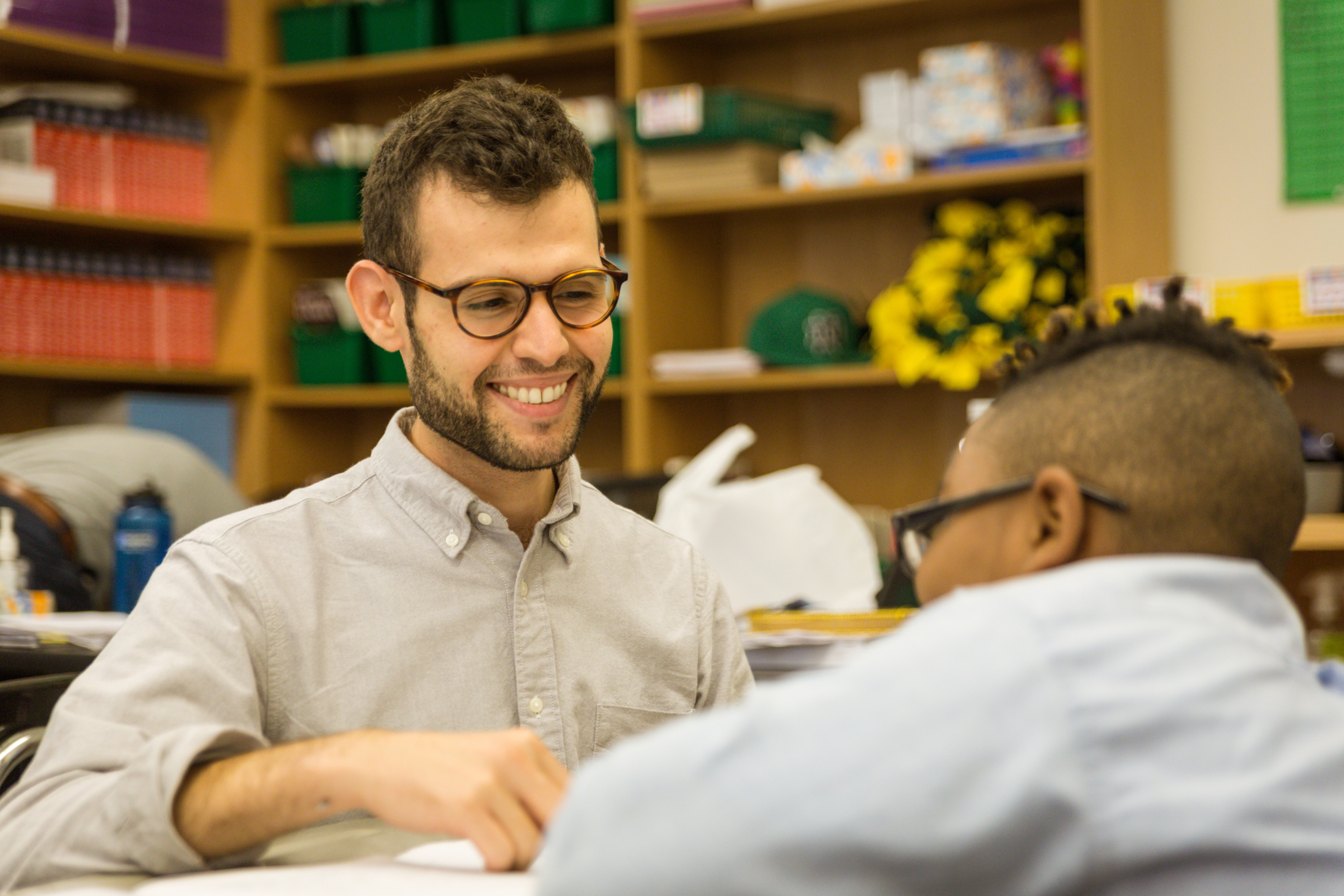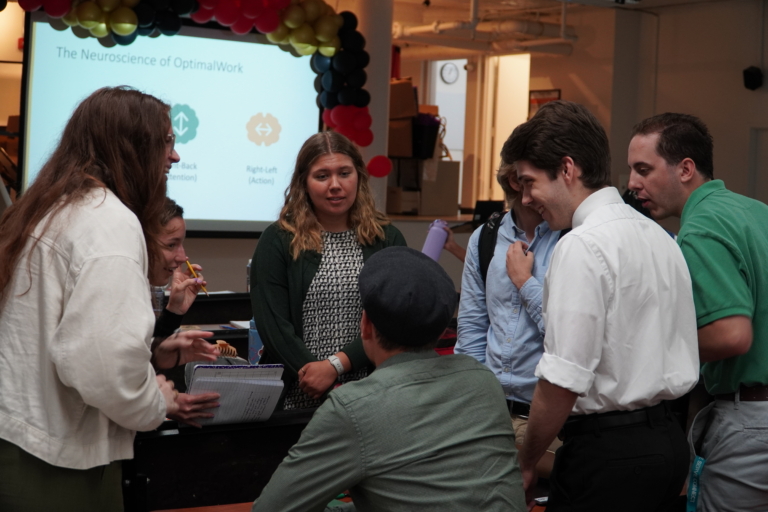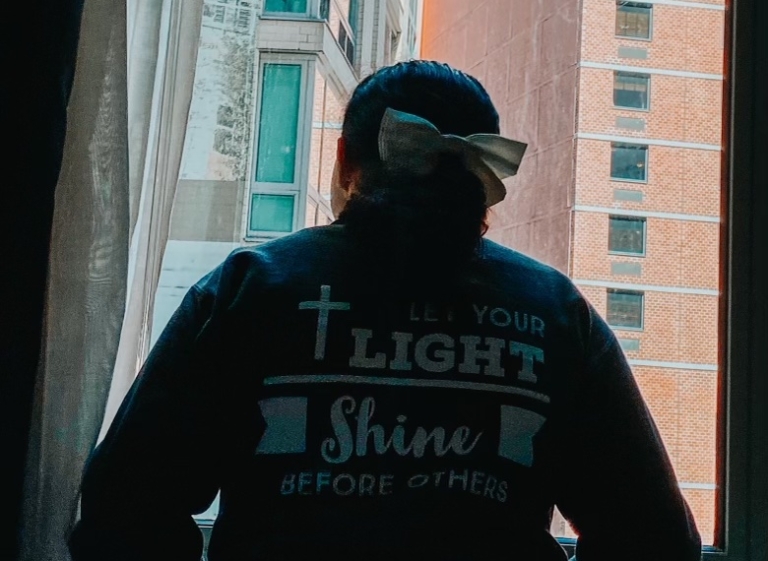Vincent Castaldi is a current Seton Teaching Fellow. He teaches 6th Grade at Brilla College Prep Middle School in the South Bronx. Prior to becoming a fellow he spent 3 years in the Jesuit novitiate, and spent time with them in England, Ireland, Wales, and Northern Ireland. He was born in Yonkers, NY and studied Philosophy and Theology at the University of Loyola in Maryland. He then went on to earn a Masters of Philosophy from Katholieke Universiteit Leuven in Belgium.
Vinny, prior to being here you were literally hopping all over the world with the Jesuit order. I’m really curious to hear how being a Fellow made it on to your radar.
Well, when I left the Society, I went home to New York, and I was thinking, “What am I going to do?!” My first thought was, my brother owns a sales business in Denver. He’s been asking me to fly over and check it out for a while, see if I wanted to do that. So I spent a week there and decided it definitely wasn’t for me.
I thought, “Okay, that wasn’t it. What am I going to do now?”
My sister found me a job as a doorman in the city. For a summer I was working as a doorman; just making some money at a building on the Upper East Side. It held me over, but I was always thinking, “What am I actually going to do now?”
I still had this idea that God was calling me to do something with education. I remember looking up different prospects online, and a couple to work at a high school seemed pretty good. I had worked in a high school in Dublin with the Jesuits. I knew I could probably do well there.
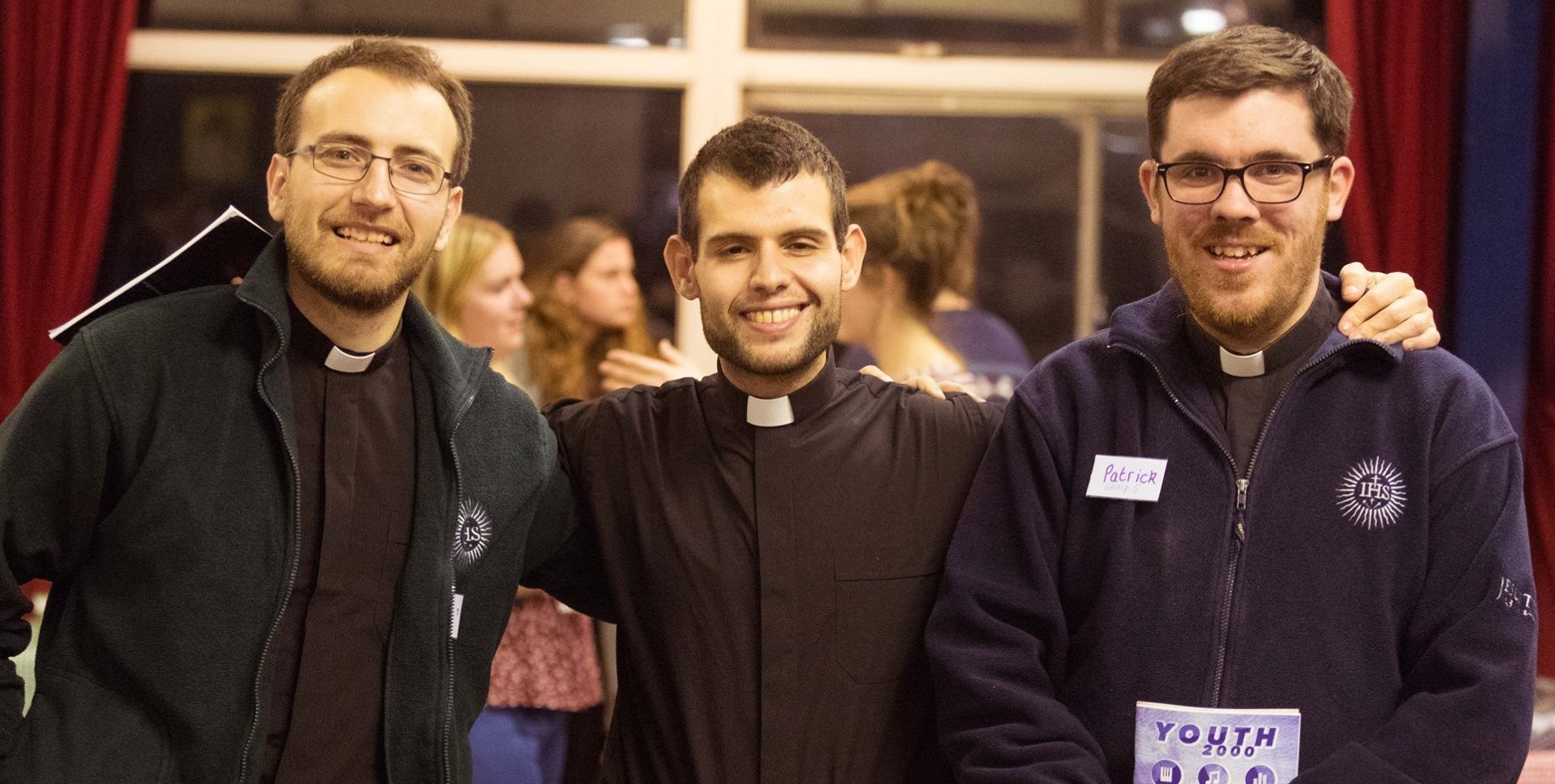
You need to continue your formation. God will work through that. It’s not wise to let go of that.
But I felt a huge need for community. I spoke with a Jesuit friend of mine who told me, “Look, Vinny, to be honest, I think what you need right now in this transition from Religious discernment to lay life is to have community and good Catholic formation. You need to continue your formation. God will work through that. It’s not wise to let go of that.”
Sounds like a smart guy. So, how did you hear about the program?
Online, it was something like a Catholic job board or Indeed, I don’t really remember. I do remember reading through the position and reaching out to a priest friend about it. I thought he might know since he’s with the Archdiocese of New York working for Cardinal Dolan, Fr. James Ferriera.
He vouched highly for Seton Teaching Fellows, said it was a good program with a great reputation. He encouraged me to apply. He said, “Why don’t you see if God wants you to do this?” So I applied, I got accepted, and now I’m here.
What was the interview process like for you? Was there a certain experience you had interviewing that let you know God was calling you to be here?
I think it was seeing an authentic witness to the faith, which I didn’t see when I was in Ireland. I thought, “In this place I would be appreciated for my commitment to serving the Church and serving God.”
It felt sometimes like I literally had to hide my faith. It was difficult because people there, in England and Wales, saw me wanting to practice my faith as having too much zeal. I saw the blessing that with the Fellows it was a good thing. I saw that this was a place I could live out my faith authentically. I could do something with catechesis, which I really liked. I could live in a community, which I knew was important for my own faith, and hopefully could help community in some way as well. I knew those were all things I was looking for.
You’ve brought the fruits of community up a couple times. What’s that been like for you?
It’s challenging. I think that a community that doesn’t challenge you isn’t really a great community. I think it’s helped me in my own faith to see that there are different charisms and spiritualities in the church and different ways I can grow in my own understanding of being a better person, a better human-being. I realize in community when something bothers me, it’s more about me. Community’s helped me see my own shortcomings.
I think community life has shown me a mirror to myself: What do I need to work on? What does this say about me? I believe God has really shown me that through community.
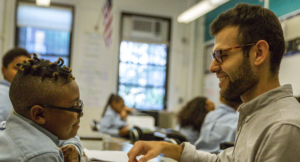
Wow, Vinny, that’s huge. Would you say God’s used your work as Fellow in a similar way to teach you something about yourself?
Yes. I need to learn more patience, for one.
For two, that I need to be able to bring my faith down, in the sense of making it understandable, instead of just living in my head trying to wrestle with these theological truths in a way I can’t explain, being able to evangelize in a very personable way.
I think teaching the disciples has taught me to be more childlike. I’m always on my toes, and I’m not naturally that kind of person. I’m the kind of person that likes to prepare for things and likes to see things coming. In the classroom, even when you prep, sometimes you just have to go with it, so I’m learning to be more flexible.
I see that as my job, to help people encounter Christ, and for me to see Christ in the other.
What would you say is the most important thing you do as a Seton Teaching Fellow?
The most important thing I do as a Fellow is help people encounter Christ.
I really believe there’s no reason for catechesis or community if it’s not in some way to encounter Christ. I see that as my job, to help people encounter Christ, and for me to see Christ in the other. That’s how I experience God in the most visible way.
What are some of the ways that Fellows are facilitating that encounter with Christ, outside of the lessons that Fellows are teaching?
For me, it’s being very intentional about prayer. We have a prayer at the beginning of every class, and whether it’s a meditation on an image or a scene in the Gospel, or moments of intercessory prayer, I really try to get the disciples to think about non-material things.
A lot of these children will pray about their X-Box, or Fortnite, and I say, “Okay, great, let’s try praying about something spiritual, or thinking about the other: the needy, the sick, someone who desperately needs our prayers.” My children will get stuck in the material or thinking about the self, and I have to work to pull them out of themselves on to Christ, on to thinking about the other.
And I do it by being a teacher who cares.
I remember my own faith formation in 6th grade was so important for me: The Dominican nun who took the time to impart her own faith on me and teach me catechesis. I don’t think I would be here without that. It’s not just about getting through the lesson plan. If we have to change the lesson plan in the middle of a class to best help my students grow, that’s okay. I want them to see this is more than just a class—I care about them growing.
I don’t really think prayer is just about what I want. Prayer is also about giving, and I’m learning that.
Has being a Fellow had an impact on your prayer life?
Very much so. I’d say especially through community.
I’ve realized I’m not really a “community prayer” kind of person. I like to pray on my own. Now I have a community that’s asking me to give of myself and my free time to pray together. I sometimes think my prayer would be more fruitful on my own, and I realize God is calling me—demanding me—to give more of myself to my brothers.
My prayer life has really been influenced by community because I don’t really think prayer is just about what I want. Prayer is also about giving, and I’m learning that.
What different kind of prayer do you guys share in community?
It depends on who’s leading it. We do a lot of Liturgy of the Hours. When I lead it, I like going through an Ignatian Examen. I love doing Ignatian Meditations as well.
We’ve also done things like faith sharing, where we’ll go through and tell one other how we’re currently doing on our faith journey, or where we think God is currently leading us, that kind of thing.
We’ll also pray the Rosary, which is great but isn’t necessarily my go-to prayer, so it’s been good to push me out of my routine and expand the ways in which I pray.
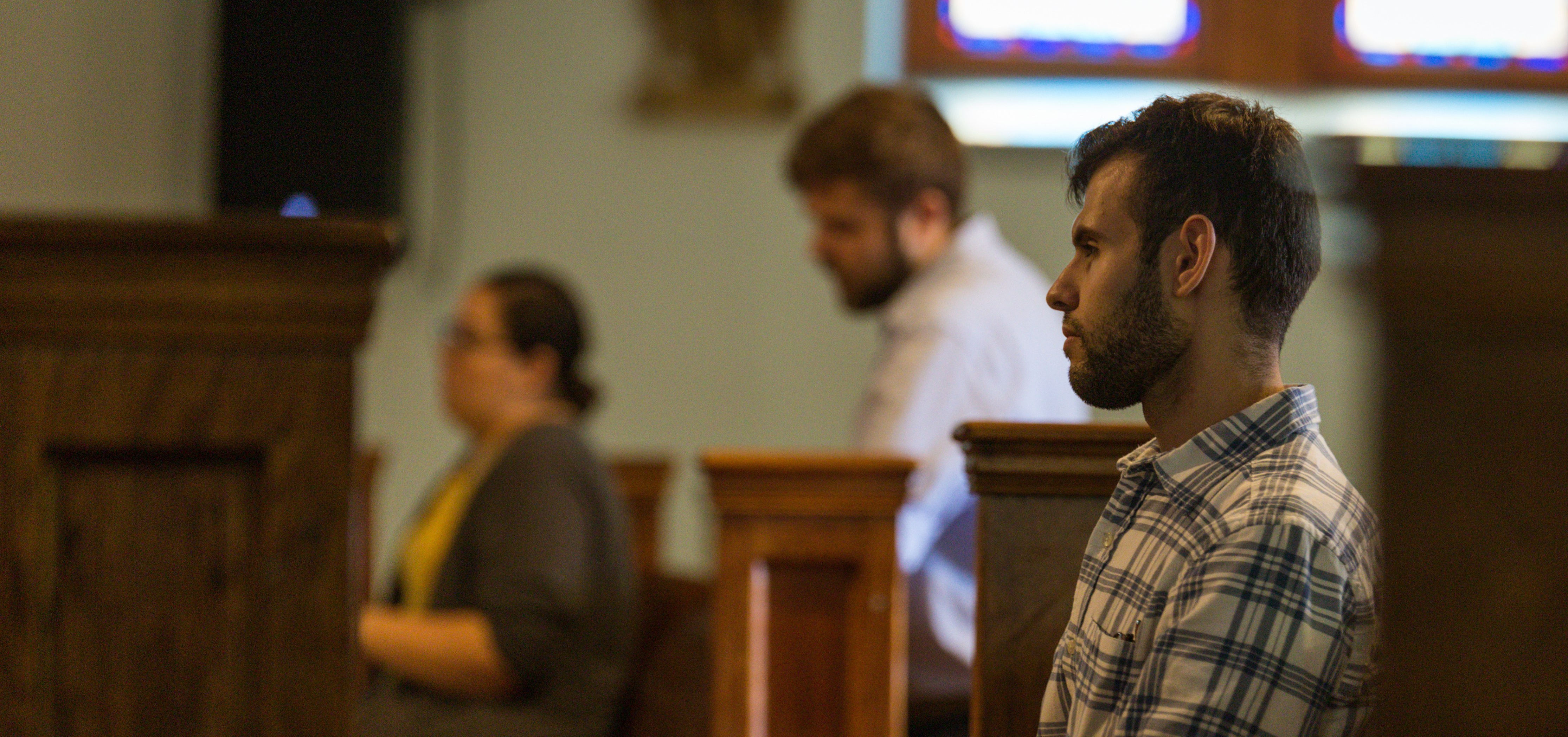
What would you say has been the most rewarding part of being a Fellow?
For me, it’s been the sense of mission, to know I’m doing something great for God, something that has great value. It’s here that I’m learning—and I think God’s trying to show me—this idea of sowing seeds.
This sense of working as part of something and belonging to something that’s so much greater than myself is humbling, but so rewarding.
This call to sow seeds in a place that I never thought I’d come back to…I’m experiencing how God’s ways are not my ways. I know God’s placed me here for a reason, at this school, with this community. This sense of working as part of something and belonging to something that’s so much greater than myself is humbling, but so rewarding.
Has being a Fellow shown you with more clarity where you’d like to go from here?
I know that’s an ongoing conversation that you don’t have to decide yet… It just seems like you’ve learned a lot. I’m wondering if you’ve got any kind of clarity about next year.
You’re right—I have learned a lot. This experience has taught me to be flexible, to trust in God, which is a prayer I still struggle with, “Jesus I Trust in You.” Fr. Pablo’s taught me I should say that more, even if I don’t mean it, just to make myself believe it [laughs].
I know God’s ways are not my ways, and that I’m now in a position where I have to respond. It’s not an issue of me saying, “I want this or that.” God shouldn’t have to treat me like I’m a child, but sometimes I really feel like one of the children saying, “That’s not fair!” [laughs]
In the sense of discernment, I’m learning that I’ve got a lot to learn. So that’s where I am, if that makes any sense.
Is there anything you think people ought to know about the Seton Teaching Fellow program?
Be open, be generous!
The lessons I’ve learned over the past six months have been far more significant in my spiritual life and professional life, and as well as my overall life, than the lessons I expected to learn coming into the program.
So be open, be generous! And don’t be so rigid in thinking, “Oh, this is what I want to get out of being a Fellow.” If you’re open to the process, God is going to reveal how much more He wants to reveal to you than the expectations you come in with.
